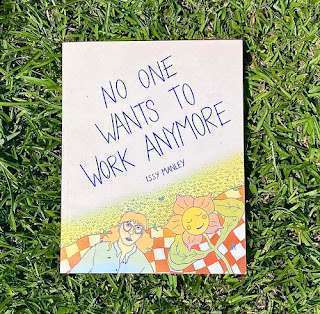Issy Manley‘s No One Needs To Work Anymore is a series of comics essays addressing labor and one’s feature in global capitalism from a non-public point of view. Their tone widely varies, given the venues these reviews in the starting up seemed. Manley is at her easiest when she’s in a screech to no doubt craft a yarn that focuses on personality over recordsdata. To illustrate, “To All The Bosses I’ve Begged For A Job” and “No longer Working” veil loads of the an identical territory, nevertheless the passe is comic and biting while the latter feels didactic and is manner too text-heavy.
The opening myth, “How Issues Are Done,” smoothly highlights Manley’s capability as a cartoonist and smartly employs her skills of dropping her job as a server originally of COVID. Starting up with the personal and then making exercise of it to a much wider swath of society is a wise manner of serving to a reader designate a advanced project, particularly if it be one where they could like preconceived notions. Cherish many who work or labored within the provider commerce, the exploitative nature of the commerce, particularly within the US, used to be one thing that used to be understood as factual the manner things functioned as a pure section of the machine. The willingness to connect such workers at high threat with out a extra reward for the length of the pandemic used to be a splash of cool water that massively set aside the lie no longer entirely to exploitation by mammoth chain restaurants nevertheless additionally (and customarily particularly) within the neighborhood-owned agencies. Manley’s sure line and considerate exercise of space colour motivate lead the sight across the page and emphasize most essential most essential capabilities.
“To All The Bosses…” is the order standout of the series, in natty section attributable to its structure and sardonic humorousness. Manley confronts head-on the demeaning quality of taking a look at for a job that is taking a look at so that you just can are making an strive to maintain it for every other motive than creating wealth. The more dehumanizing the order job or commerce (love the relaxation in baking, consulting, or funding), the more they play up their “values” and seek recordsdata from that workers play alongside. Manley uses an array of wise visual recommendations to care for the reader engaged with both her get yarn (badly needing a job) and the critique of what jobs are. The entirely quite dissonant tone used to be the digression into imagining a job that is factual and soft in a company structure. I designate the craving and even admire her hoping here is possible, nevertheless critiques that introduce fantasy utopian scenarios without a bridge to how they could very smartly be possible are inclined to tumble flat.
Seriously greater in that regard is the titular essay, “No One Needs To Work Anymore.” It be one other COVID-generation essay that this time turns the narratives of others she interviewed into anecdotes, where everyone is drawn as an anthropomorphic flower. The parable addresses the coronary heart of the labor battle within the US: the clash between the so-referred to as “Protestant Work Ethic” with the concept that of a lifestyles dedicated to one thing other than factual labor. This used to be introduced into interesting relief for the length of the pandemic when the executive equipped small amounts of cash to every citizen, suspended pupil loan repayments, and forestalled rent. For low-profits workers, this supplied up a stage of freedom that used to be unheard of for them, and the narratives confirmed how much happiness this introduced. Whereas some stayed inner and browse for pleasure, others took the time to volunteer or otherwise care for fascinating. Moreover, when the quarantines ended and agencies began to open up, it ended in many no longer wanting the an identical passe shitty jobs anymore. Manley hits on this collective serious be-careful call for one section of the population and a flawed sense of entitlement for folk that anticipated the others to merely tumble abet in line. Right here, Manley’s digression into anti-work fantasies and a different world makes some distance more sense. Manley positively has that Dan Nott type of the exercise of a light visual type to contrivance refined complications, and I’m in a position to be outlandish to survey her no doubt sink her enamel into one thing lengthy-maintain.
Anna Sellheim did not like a feeble comics entry this 300 and sixty five days. As a substitute, she introduced a pair of zines she made for the Refugee Early life Project After Faculty & Summer season Faculty Programming from Baltimore Metropolis Community Faculty. Sellheim’s Promo Zine is precisely what it sounds love: a comedian ebook describing her skills as an art/comics teacher for young refugees from a differ of countries. Sellheim’s anecdotes are comic, blunt, and optimistic without overstating things. Her get previous facing no longer factual trauma, nevertheless somatic trauma responses deeply informs how she interacts with the college students, even when their trauma experiences are fully different. Sellheim additionally will get into how the cultural shock for refugees coming to the US is some distance deeper than it can presumably seem in the starting up attach while additionally providing the fundamentals of how the program works. It be an supreme promotional instrument for the RYP because it be from an insider who no doubt believes within the worthwhile qualities of the program. RYP Zine consists mainly of art from Sellheim’s college students, along with to poetry and other writing. Sellheim lets the contributors’ work talk for itself while alongside side some highly supportive notes within the bio share. That is utilized cartooning at its easiest, because it encourages every pupil to develop and order their very get insist as they work to regulate to American culture.




